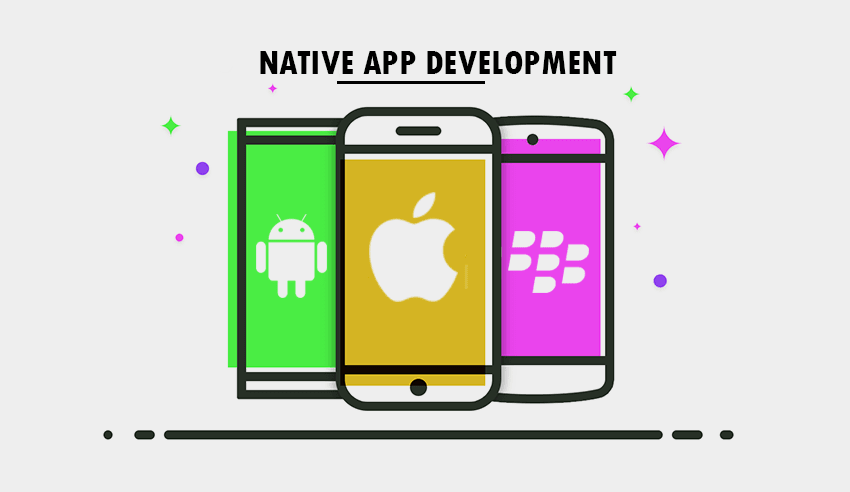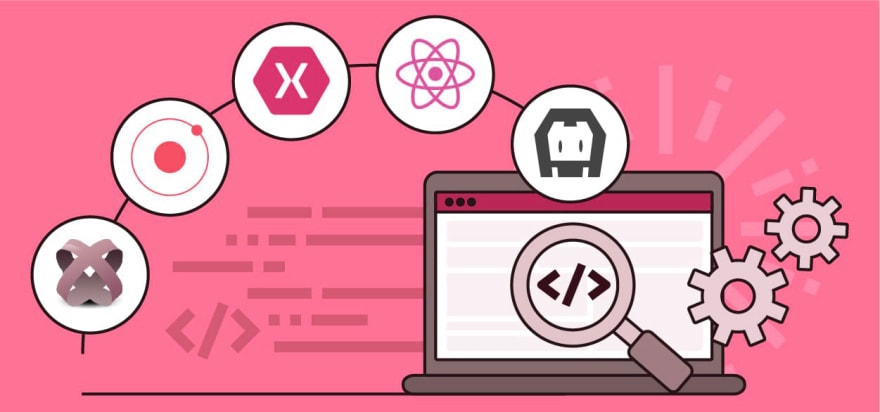People make many life- and business-related decisions using the Internet or mobile applications. According to the statistics, the annual number of mobile app downloads is projected to reach 299 billion in 2023. The COVID-19 pandemic made businesses realize that software is the key to withstanding competition and reaching a wider audience. With such an increased user interest, it’s a great time to build your own mobile app.

The stats show that there are 1.85 million apps in the App Store and 2.56 million on Google Play Store. The common reasons businesses build custom mobile apps are:
- added value to customers;
- enhanced customer engagement;
- high-quality customer service;
- increased revenue;
- develop brand awareness.
Once you`ve decided to develop one, the next step is selecting the right approach.
The two choices are native and cross-platform application development. If you hesitate between them, you’re in the right place. In this article, we will take a closer look at custom mobile app development and compare native vs cross-platform mobile app development, analyzing their pros, cons, and potential use cases.
What is Native App Development?

Native apps are aimed at specific operating systems and devices like Android and iOS. The development process involves tailoring them to a certain platform.
Popular programming languages for native app development include Java and Kotlin for Android and Swift and Objective-C for iOS mobile apps. Native mobile apps are an excellent option if your focus is user experience and interface. This approach lets engineers use hardware elements like GPS, camera, or microphone.
The Benefits of Native Apps
Robust Functionality
Optimization for a certain platform ensures efficiency and fast performance. With no limits in the development process, mobile app developers can leverage APIs and tools provided by a platform.
Additionally, native apps perform flawlessly even if there is no Internet connection. They are more convenient for users living in remote areas or with limited Internet connectivity.
Enhanced scalability
A wide choice of tools and flexible resource management make apps more scalable in the native environment. It is easier to integrate new complex features and technologies. Moreover, the testing process is not so lengthy and demanding.
Supported by app stores
Before publishing, app stores check native apps for data security to make sure they are safe and reliable.
Great performance and UX design
When choosing tools for mobile app development, pay attention to those offering excellent interaction experiences. Native apps are faster because many elements are preloaded, and the data is obtained from the web. The highlight of native apps is attractive UI/UX design combined with simple navigation and a straightforward user experience.
The Drawbacks of Native Apps
Costs a pretty penny
Native app development requires much investment, especially for large-scale projects. This is the first obstacle for businesses. If you plan to launch an app on both platforms, be ready to double your budget.
Requires more time
The scope of work done for one platform can’t be used for another. Since you need to build two apps from scratch, your teams require more time to work on different versions.
A bigger tech team is needed
Native mobile apps require a specific tech stack for different platforms. Hence, it’s hard to find a developer who will build a native app from start to finish. Two teams with different tech stacks are needed to build native apps, while the cross-platform type requires only one team.
When is Native App Development Good?
Native app development is a good fit if:
- Robust UX and functionality are a highlight of your mobile app;
- You need to use certain device functionality like sensor or camera;
- You need to involve 3D elements and animations.
What is Cross-Platform App Development?

Cross-platform mobile apps operate on a unified code base on any OS. Tools like React Native, Xamarin, or Flutter are popular to build cross-platform apps. This approach saves your time and budget, but you sometimes need to compromise the functionality and productivity.
It’s hard to build an app that runs seamlessly on multiple platforms without exceeding the framework capabilities. Cross-platform app development services are preferred by startups that ###strive to optimize their resources.
The Benefits of Cross-Platform Apps
Reusable code
80% of code can be applied on different platforms in a single codebase. It speeds up product development and simplifies the work of engineers.
Speedy and affordable development
A single development cycle is necessary to build such an app. Hence, you need fewer engineers and less time to complete the app development project.
Wider user reach
Cross-platform apps are an excellent option for enterprises that want to reach a broad audience on both platforms within a short time.
Easy maintenance
A unified codebase means making easier updates and fixes. Changes are more accurate, ensuring enhanced performance on all platforms.
The Drawbacks of Cross-Platform Apps
Slower performance
Performance speed is a key factor when comparing native app development versus cross-platform app development. An additional abstraction layer needed for cross-platform apps slows down the performance.
Limited features
Cross-platform solutions have limited support from libraries and SDKs. It can be difficult to customize an app and integrate all the desired features.
Basic UI/UX design
Native UX components can’t be used by cross-platform apps. That’s why they provide an inferior experience compared to native apps.
When is Cross-Platform App Development Good?
A cross-platform app is a good fit if:
- You want to launch a mobile app on multiple platforms within a tight budget;
- You target both iOS and Android;
- Fast app development is needed;
- The app has a rather basic feature set that doesn’t differ on different platforms.
A few words about hybrid apps
The hybrid approach lies between a native app or a cross-platform solution. The code is written with CSS/HTML and JavaScript. Then, the code is embedded using such plugins as Capacitor, Apache Cordova, Sencha, etc. It allows access to native functionality, yet the code is written only once for many platforms.
Hybrid apps aim to provide a native-like experience with less effort. Hybrid apps have a smooth UI/UX, and their maintenance and backend development are cheaper and more affordable. However, hybrid apps still lack OS support for specific functionality.
How to Choose the Right Approach for Mobile App Development?
Here are the most important factors to consider when building your mobile application. The fundamental difference between native and cross-platform solutions is the amount of effort and resources you are ready to invest. Before you start the development itself, you need to clarify the following points:
Complexity
If your app deals with heavy data processing or requires access to native functionality and APIs, native app development is optimal for you. If you need something more basic and realize that you can avoid extra performance, cross-platform development is better for your product.
Costs
The chosen technologies and tools for mobile app development also influence the final choice. Platform-specific apps require larger teams with expertise in specific technologies. The main problem is writing separate codebases for every OS.
Time-to-market
Sometimes you need to get an MVP built quickly to exceed the competition. Cross-platform development saves a great deal of time to release an app on all OS and devices.
UI/UX design requirements
The right tech stack for mobile app development is essential to reach your design goals. Pay special attention to front-end development tools responsible for interaction with users. Native app development focuses more on user experience, while the cross-platform approach limits the opportunities.
Native vs Cross Platform App Development: Which is the Winner?
None of the app types discussed in this article is a universal choice for every development project. Before making a choice, you need to clarify your expectations and define your budget. You also need to consult tech-savvy specialists to choose an optimal tech stack. If complexity and flawless user experience are your priority, native app development will work for you.
However, be ready to make big investments. To reach the maximum audience with a limited time and budget, multi-platform app development will fit you. But be prepared for a weaker user experience and a more basic UI/UX design.
To Wrap Up
Regardless of the industry, businesses need to build their own mobile app to reach more customers and keep up with the competition. The final decision on hybrid, native or cross-platform development depends on your unique project conditions and requirements.
Defining your goals, needs, and priorities is the primary step towards the success of your mobile app in the market. All the approaches have their benefits and drawbacks, so you need to figure out which will be most advantageous for your mobile app project.
Hopefully, this article will help you evaluate the main points and select an optimal approach for custom mobile app development.



Oldest comments (0)